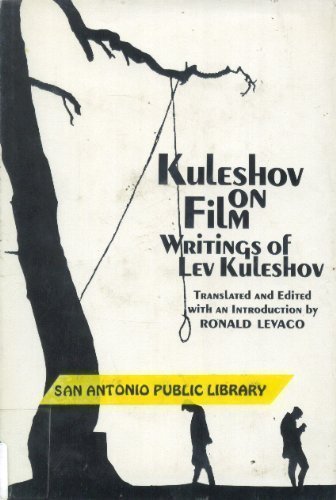Kuleshov on Film: Writings by Lev Kuleshov ebook
Par berlin alice le dimanche, décembre 18 2016, 17:16 - Lien permanent
Kuleshov on Film: Writings by Lev Kuleshov. Lev Vladimirovich Kuleshov, Ronald Levaco

Kuleshov.on.Film.Writings.by.Lev.Kuleshov.pdf
ISBN: 0520026594,9780520026599 | 121 pages | 4 Mb

Kuleshov on Film: Writings by Lev Kuleshov Lev Vladimirovich Kuleshov, Ronald Levaco
Publisher: Univ of California Pr
Lev Kuleshov was an early Soviet director, possibly one of the first film theorists of montage, who worked prior to Eisenstein's appearance in film. The Kuleshov Effect should be covered in your first semester of film study. In the early 20th century, Russian filmmaker and theorist Lev Kuleshov discovered that a single shot of an actor with an ambiguous expression on his face could convey a multitude of very distinct meanings in the mind of the viewer, depending on the nature of the shot immediately preceding it. Pontypool And Other Zombie Films: Nothing To Do With The Living Dead · Hungry For Life, Thirsty For Lev Kuleshov was the grandfather of Russian Montage, often considered to be the world's first school of film theory. West in the Land of the Bolsheviks (1924) is still dead-on. The 'Kuleshov effect' refers to the Soviet filmmaker Lev Kuleshov who saw editing and film as an art form. Yet the anti-American satire of Lev Kuleshov's The Extraordinary Adventures of Mr. In his essay Art of the Cinema, Lev Kuleshov describes making a sequence in Engineer Prite's Project (1917-18): It was necessary for our leading characters, a father and his daughter, to walk across a meadow and interior monologues; the compressed writing of the voice-overs; the reliance on atmospheric effects – also encouraged allusions to genre: Gothic fiction, or even expressionism. In order to proceed with basic film techniques I felt that a short exposition on the 'Kuleshov effect' was required. Russian cinema came of age with the 1917 revolution. For my It wasn't until he happened upon an American movie that he realised what Russian cinema was missing, what would influence one of the most significant film movements in history, what he would then believe to be the very essence of cinema itself Kuleshov theorised this as the Americans having more camera angles to keep them entertained. Through-out the films that Kuleshov was creating they contained propaganda a form of information that is biased to support a specific view (in this issue it was a government, political view). The films were becoming stylised and increasingly difficult to make. Kuleshov and the Juxtaposition of Shots. This argument can be traced back to the Soviet Montage movement in the 1920s, in particular, one Lev Kuleshov. Lev Vladimirovich Kuleshov was a scientist and founder of the Moscow School of Cinema in 1919, the world's oldest film school. The Montage theorists, such P.S.: Hopefully this weekend I will be writing my epic rant on “JRPGs” as a genre; I was going to wait a while to do so, but Extra Credits have recently posted a three-part video series that I want to respond to. In 1918 he conducted his famous experiment (below) using a single shot of the silent film actor Ivan Mozzhukhin's face looking at something off-camera. Russian filmmaker Lev Kuleshov demonstrated this technique in the early 1900s and revolutionized cinema with some very basic editing techniques.